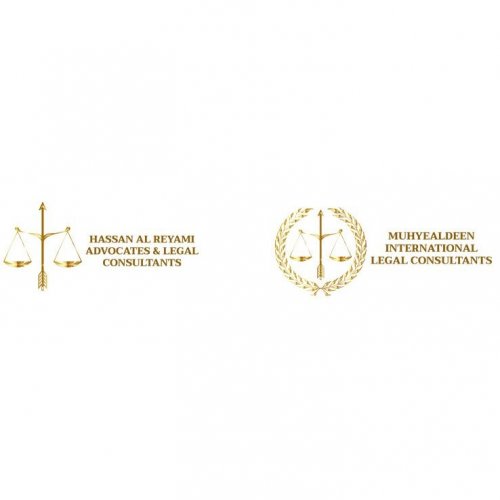Best Water Law Lawyers in Abu Dhabi
Share your needs with us, get contacted by law firms.
Free. Takes 2 min.
List of the best lawyers in Abu Dhabi, United Arab Emirates

The Black Robe For Legal Consultancy & Debit Collection
1 hour Free ConsultationAbout Water Law in Abu Dhabi, United Arab Emirates
Water Law in Abu Dhabi governs the use, management, conservation, and protection of water resources within the Emirate. Given Abu Dhabi’s arid climate and limited natural freshwater sources, water is a highly valuable resource crucial for both individual livelihoods and economic development. Water Law encompasses regulations related to groundwater extraction, desalinated water distribution, agricultural irrigation, wastewater treatment, conservation policies, and licensing for water-related activities. The law is designed to ensure sustainable management of water resources while balancing social, economic, and environmental priorities.
Why You May Need a Lawyer
Navigating Water Law in Abu Dhabi can be complex due to overlapping regulations, strict licensing requirements, and evolving sustainability policies. Individuals and businesses may require legal assistance for situations such as:
- Obtaining or renewing permits for groundwater extraction or wells
- Compliance with environmental and health regulations on water use and disposal
- Negotiations or disputes over water rights between landowners, businesses, or government authorities
- Projects involving desalination, wastewater treatment plants, or irrigation systems
- Responding to enforcement actions for alleged violations of water regulations
- Reviewing and drafting contracts involving the sale or lease of water rights
- Advice on regulations for water-related industries, including agriculture and construction
A lawyer with experience in Water Law can help interpret the relevant regulations, represent you in administrative or court proceedings, and protect your interests in transactions or disputes.
Local Laws Overview
In Abu Dhabi, Water Law is shaped by federal legislation from the United Arab Emirates as well as regulations issued by local authorities. The Abu Dhabi Environment Agency (EAD) and the Department of Energy (DoE) play significant regulatory roles. Key aspects include:
- Groundwater Regulation: Extraction of groundwater requires licensing and is subject to monitoring to prevent over-extraction and contamination.
- Desalinated Water Use: Most potable water comes from desalination. Distribution is regulated and supplied through public utilities, with usage tariffs set by authorities.
- Irrigation and Agriculture: Special rules apply to water used for agricultural purposes, including efficiency measures and permitted extraction limits.
- Wastewater Management: Discharge and reuse of treated wastewater are strictly regulated to protect health and the environment.
- Conservation Policies: The government promotes efficient water use in homes, businesses, and public institutions, with penalties for waste or unauthorized activities.
- Water Quality Standards: Stringent quality standards apply to potable and reused water to safeguard public health.
Violations of water laws can result in administrative penalties or legal proceedings. Proactive compliance and legal guidance are highly recommended.
Frequently Asked Questions
What permits are required for drilling a water well in Abu Dhabi?
A permit is required from the Environment Agency Abu Dhabi (EAD) for drilling, operating, and maintaining water wells. Unauthorized drilling or extraction is prohibited and subject to penalties.
Can private landowners extract groundwater for their own use?
Private landowners may extract groundwater, but only within limits and with the proper licensing and metering in place as prescribed by local regulations.
How is water use regulated in the agricultural sector?
Agricultural water use is subject to strict controls, including extraction quotas, efficiency requirements, and the use of treated wastewater where possible to conserve fresh water.
Are there restrictions on disposing of wastewater?
Yes, all disposal and reuse of wastewater must follow EAD and Department of Energy regulations, including discharge standards and treatment requirements.
What penalties exist for violation of water regulations?
Penalties can include fines, facility closure, restitution for damages, and, in certain cases, criminal prosecution for severe violations.
Who allocates and manages water distribution in Abu Dhabi?
Water distribution is controlled by public utilities under the Department of Energy, ensuring the supply of desalinated water to consumers according to set policies and tariffs.
Can I sell or lease my water rights?
Transfers of water rights are highly regulated and generally require government approval. Legal advice is essential before entering into agreements related to water rights.
How does water quality regulation affect businesses?
Businesses must comply with strict standards for water use and disposal, particularly those in food, beverage, agriculture, and industrial sectors. Regular inspections and monitoring are common.
What should I do if I receive a notice of violation from authorities?
It is advisable to seek legal counsel immediately. A lawyer can review the notice, advise on compliance options, and represent your interests in dealings with authorities.
Are there water conservation incentives for homes or businesses?
Yes, the government offers programs encouraging water-saving devices and practices. These may include subsidies, awareness campaigns, and preferential tariffs for efficient use.
Additional Resources
For further information or support regarding Water Law, consider contacting:
- Environment Agency Abu Dhabi (EAD): Regulates water extraction, groundwater management, and environmental compliance.
- Department of Energy (DoE), Abu Dhabi: Oversees water distribution, desalination plants, and utility policies.
- Abu Dhabi Agriculture and Food Safety Authority (ADAFSA): Offers guidance on agricultural water rules and best practices.
- General Secretariat of the Executive Council - Legal Affairs Office: Provides overarching regulatory and legal supervision.
- Licensed legal firms specializing in environmental and water law.
Official government portals and helplines are also available for up-to-date regulations and forms.
Next Steps
If you require legal assistance concerning Water Law in Abu Dhabi:
- Gather all relevant documentation, such as licenses, permits, contracts, and any official notices or correspondence.
- Identify the specific issue or question you need help with, whether it is acquiring permits, responding to a violation, or negotiating a transaction.
- Consult a law firm or legal consultant with experience in UAE Water Law and local Abu Dhabi regulations.
- During your consultation, present all your documents and clearly explain your objectives or concerns.
- Follow your lawyer’s guidance regarding compliance, dispute resolution, or representation before authorities or the courts.
Prompt legal advice ensures your interests are protected and helps you navigate the complex landscape of Water Law in Abu Dhabi.
Lawzana helps you find the best lawyers and law firms in Abu Dhabi through a curated and pre-screened list of qualified legal professionals. Our platform offers rankings and detailed profiles of attorneys and law firms, allowing you to compare based on practice areas, including Water Law, experience, and client feedback.
Each profile includes a description of the firm's areas of practice, client reviews, team members and partners, year of establishment, spoken languages, office locations, contact information, social media presence, and any published articles or resources. Most firms on our platform speak English and are experienced in both local and international legal matters.
Get a quote from top-rated law firms in Abu Dhabi, United Arab Emirates — quickly, securely, and without unnecessary hassle.
Disclaimer:
The information provided on this page is for general informational purposes only and does not constitute legal advice. While we strive to ensure the accuracy and relevance of the content, legal information may change over time, and interpretations of the law can vary. You should always consult with a qualified legal professional for advice specific to your situation.
We disclaim all liability for actions taken or not taken based on the content of this page. If you believe any information is incorrect or outdated, please contact us, and we will review and update it where appropriate.












